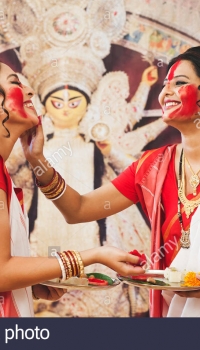This year the annual festival of Durga Puja celebrated with great pageantry, festivity and excitement inside our housing society in the middle of Delhi, sees me confined at home with a fractured foot and a shoulder. Today is Panchami: the pandal in the society grounds, created like the Dakshineshwar Kalimandir, is ready to receive the idol of Durga and her children, the huge stage erected on the other end is busy with frantic rehearsals of the various musical and dramatic performances by the society populace to be held over the 5-day festival. Men, women, and of course, the children are planning what to wear, what to eat and which contests and games to participate in. I am on the periphery, ensconced in my wheelchair, trying to enjoy it all through the antics of friends and relatives.
Since Durga Puja is holding everything in the natural and manmade world in thrall, I was amused to come across, in this morning’s Delhi Times an article glorifying ‘Sindoor Khela no conditions apply’. Strange, because no conditions anyway apply to the wearing or not wearing of vermilion!
On reading further, I realized this was campaign begun last year in Kolkata by Tridhara Sammelan wherein, they had invited widows, divorcees, transgenders to join the married ladies in sindoor khela on the last day of the Durga Puja. Apparently, this movement has now been extended to Delhi-NCR. ‘Wonderful lobby for inclusivity!’ That is what you, I and everyone else will declare. ‘Let’s all do it!’
Stop! Wait a bit.
First, let us understand the meaning of sindoor khela. On the last day of the Pujas, when we bid adieu to Goddess Durga, married ladies apply sindoor on the parting of her hair and feed her sweets. This is a common ritual across Bengal when a married lady, visiting her parental abode, leaves.
But do you know what each married woman whispers into the ear of the Goddess while applying sindoor? She says, ‘O Mother Durga, bless me so that next year, too, I may come before you with sindoor in my parting and in all the splendor of my marital status.’
Implicit in this request is a blessing for the life of her husband and the fact that she can be splendid only if she remains married! How patriarchal is that?
Is woman’s worth to be judged by whether she has the right to wear sindoor or not? How does that red line in her hair make or break her? Is this patriarchal concept the right vehicle for social inclusivity? Will widows, divorcees or transgenders appreciate participating in such a ritual that harks of the dark ages? After all, haven’t most of them emerged from that dark tunnel into the light of freedom from such harnesses?
Besides whether she wears vermilion or not is a matter of choice and not dependant on her marital status. In fact, today many married women do not wear sindoor at all. I remember the criticism spewed at yesteryear film star Rekha when she appeared at some function with sindoor in hair despite her unmarried state! Weird!
I don’t understand how people started off the Sindoor Khela noconditionsapply movement without delving deeper into the specific ritual they want to piggyback it on. It shows utter disregard for authenticity of their intentions and only a desire for publicity via superfluous means.
To all those who want to jump on the bandwagon of SindoorKhela noconditionsapply--- beware! By doing so you are supporting and promoting a thoroughly patriarchal ritual.
But let’s look at the other side of this ritual. Sindoor Khela brings together all women, whether rich or poor, modern or traditional, old or young, friend or stranger. They apply the festive vermilion on each other, bring sweetness into the others’ lives by feeding mishti and exchanging greetings of prosperity. It is bonhomie transcending creed, status and age. It is a conflagration of women power! And can Womanhood be powerful if some of its members are kept away from such a display of Her power? So, it is perfect if we bring into this fold all the widows, divorcees and transgenders---certainly! Then we can turn Sindoor Khela noconditionsapply into a movement of Women Power; a movement that profiles Shakti, the essence of a woman. It, then, has nothing to do with sindoor being a symbol of a woman’s marital status. Sindoor is the red banner waved by women of strength and will power who are going places all by themselves on their own acumen, sagacity and grit.
In the light of the above, I believe it is time that the modern woman, while bidding farewell to Goddess Durga must loudly proclaim, ‘O Shakti, bless me with so that, year after year, my strength endures, I remain steady on my path to empowerment. I always remain my own person…sindoor or no sindoor.’
From my wheelchair, my offering to to Ma Durga…
Rupam Dehi, Jayam Dehi,
Yasho Dehi, Divsho Jahi…
Grant us your form, Grant us victory,
Grant us benediction, Eliminate all animosity…
@Sutapa Basu All rights reserved 2018
